| Srl | Item |
| 1 |
ID:
161170


|
|
|
|
|
| Summary/Abstract |
Scholars studying Chinese development have long acknowledged the significance of the hukou system in impeding internal migration and defining welfare entitlements. However, another crucial barrier is often overlooked: the incomplete transferability of acquired welfare rights. By examining the case of the Urban Employee Basic Pension System, this paper aims to understand how the limited transferability of acquired rights acts as an obstacle to labour migration and entitlement accomplishment. It also seeks to explore the factors that are accountable for the low level of welfare rights transferability. Our findings suggest that migration and entitlement barriers today may not be so much a question of a particular form of hukou exclusion but more of a problem of insufficient rights portability. An in-depth understanding of the structural constraints of China's reform-era migration and rights attainment needs to take into account the transferability of welfare entitlements for migrant workers, and go beyond a narrow conceptualization of the hukou system per se.
|
|
|
|
|
|
|
|
|
|
|
|
|
|
|
|
| 2 |
ID:
113843
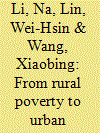

|
|
|
|
|
| Publication |
2012.
|
| Summary/Abstract |
China's impressive growth has been accompanied by huge rural-urban divide and social sacrifice of many including rural-urban migrants. Reflecting on the documentary Last Train Home (2009) by Lixin Fan, this paper identifies and examines the life of rural-urban migrants in China in terms of poverty-reduction, child-care, education and equal opportunities for a better life. By comparing the seemingly difficult and tragic life of the Zhang family against statistical facts, it shows that their suffering and struggles are common to most migrants. In essence, by creating an interactive dialogue between the film and the economic reality in China, this paper highlights the severe constraints on the Chinese peasantry and discusses the implications of limited choices and social injustice towards rural-urban migrants. It argues that the inequality in opportunities and the lack of social care for migrants has created huge social cleavage that not only reduces social welfare but may also impede further development.
|
|
|
|
|
|
|
|
|
|
|
|
|
|
|
|
| 3 |
ID:
093842
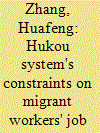

|
|
|
|
|
| Publication |
2010.
|
| Summary/Abstract |
Most studies on discrimination against migrants in Chinese cities focus on wage differentials. This paper endeavours to develop an alternative way of explaining the institutional discrimination against migrants by studying workers' job mobility rates in three cities: Beijing, WuXi and Zhuhai. Migrants are commonly perceived to have high occupational mobility; however, Cox proportional hazards regressions in this paper show a different picture. Institutional discrimination reduces the number of jobs available to the migrants, increases their job search costs and the cost of losing jobs. Even though migrants take jobs unacceptable to local residents, the effects of this institutional discrimination still constrain migrants in changing jobs. The regressions show that temporary migrants have longer job durations and shorter unemployment durations than local people or permanent migrants. Moreover, migrants start to change jobs more often only after they have stayed in the city for some time and have accumulated enough assets to be able to survive when unemployed.
|
|
|
|
|
|
|
|
|
|
|
|
|
|
|
|
| 4 |
ID:
146512
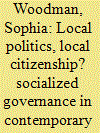

|
|
|
|
|
| Summary/Abstract |
The demise of collective units that attach citizens to the state in China has been overstated; the hegemonic form of Chinese citizenship today links participation and welfare entitlement to membership in a collective unit in a specific locality. This article presents an ethnographic account of the operation of this “normal” form of local citizenship in resident and villager committees in Tianjin. These committees combine participatory and welfare dimensions of citizenship in one institutional setting. Here, citizens are bound to the state through a face-to-face politics that acts both as a mechanism of control and a channel for claims-making, a mode of rule I term “socialized governance,” which blurs the boundaries between political compliance and social conformity, and makes social norms a strong force in the citizenship order. While variably achieved in practice, this form of citizenship represents an ideal that shapes conditions for politics and perceptions of inequality.
|
|
|
|
|
|
|
|
|
|
|
|
|
|
|
|
| 5 |
ID:
159033
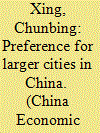

|
|
|
|
|
| Summary/Abstract |
China has long aimed to restrict population growth in large cities but encourages growth in small and medium-sized cities. At the same time, various government policies favor large cities. We conjecture that larger cities in China offer a better quality of life and more opportunities. We thus predict that a typical rural-urban migrant is willing to give up some income in order to live in a larger city. We present a simple model in which rural-urban migrants choose destination cities to maximize utilities from consumption and urban amenities. Drawing data from a large-scale population survey conducted in 2005, we first estimate each migrant's expected earnings in each possible destination city using a semi-parametric method to correct for potential selection bias. We then estimate the typical migrant's preference for city population size, instrumenting population size with its lagged values to control for potential omitted-variables bias. From these estimation results, we calculate the typical migrant's willingness to pay to live in larger cities. Our results show that indeed rural-urban migrants strongly prefer cities with larger populations. We explore possible explanations for this preference and discuss the implications of these findings.
|
|
|
|
|
|
|
|
|
|
|
|
|
|
|
|
| 6 |
ID:
052290
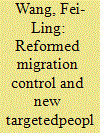

|
|
|
|
|
| Publication |
2004.
|
| Summary/Abstract |
This article outlines the latest reforms of China's hukou system in 1997-2002 and reports the system's functional changes and continuities. Today's hukou system still performs two leading functions: the widely discussed internal migration control with reformed mechanisms and the previously scarcely examined socio-political management of the targeted people (zhongdian renkou). An adapted and adjusted hukou system is expected to continue as a key component of China's institutional framework, playing a crucial role to determine socio-political stability, facilitate a rapid but uneven economic growth, and shape socio-economic stratification and spatial inequality in the PRC.
|
|
|
|
|
|
|
|
|
|
|
|
|
|
|
|